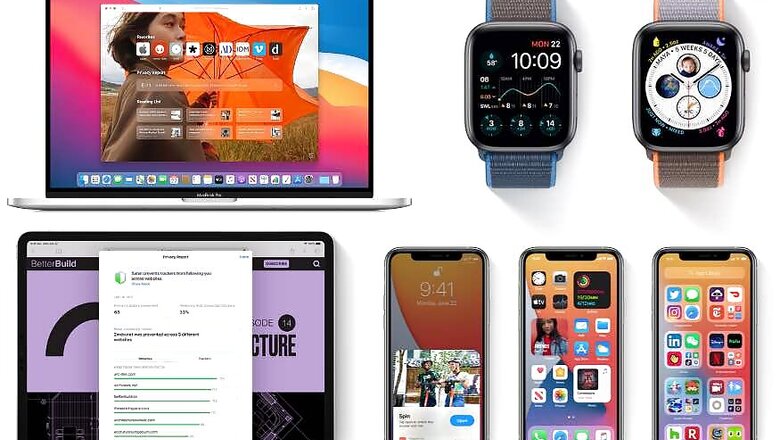
views
The much-awaited confirmations around the next software updates for the Apple iPhone, the iPad, the Mac computing devices as well as the Apple Watch, were duly announced at the Apple Worldwide Developer Conference, or WWDC 2020 a few hours ago. Later this year, Apple will be rolling out iOS 14, iPadOS 14, macOS Big Sur and watchOS 7 for compatible iPhones, iPads, Macs and Apple Watch devices, with performance updates, new features and privacy enhancements. That inevitably leads us to the big question—will my iPhone or iPad or Mac be able to run the upcoming operating system updates?
If you are an iPhone user, you will be in luck with iOS 14 if you have an iPhone 11, iPhone 11 Pro, iPhone 11 Pro Max, iPhone XS, iPhone XS Max, iPhone XR, iPhone X, iPhone 8, iPhone 8 Plus, iPhone 7, iPhone 7 Plus, iPhone 6s, iPhone 6s Plus, iPhone SE (2nd generation) and the iPhone SE (1st generation). In fact, the iPod touch (7th generation) will also get the iOS 14 update. This means that in the year that has gone by since the iOS 13 update rolled out, no device has lost support and all iPhones that run iOS 13 will get the update to iOS 14 as well. Look at the how far back the update compatibility spans, with the iPhone 6s launched in 2015 being the best example, and it remains hard to beat Apple’s compatibility focus as far as new software updates are concerned.
It is a similar story with the iPadOS 14 as well. If your iPad already runs iPadOS 13 released last year, you will be in line to get the iPadOS 14 when it rolls out later this year—no device has been dropped this year. This means the iPad Pro 12.9-inch (4th generation), iPad Pro 11-inch (2nd generation), iPad Pro 12.9-inch (3rd generation), iPad Pro 11-inch (1st generation), iPad Pro 12.9-inch (2nd generation), iPad Pro 12.9-inch (1st generation), iPad Pro 10.5-inch, iPad Pro 9.7-inch, iPad (7th generation), iPad (6th generation), iPad (5th generation), iPad mini (5th generation), iPad mini 4, iPad Air (3rd generation) and the iPad Air 2 will get iPadOS 14. The list is pretty exhaustive and even the iPad Air 2 launched in 2015 will get the latest operating system.
macOS Big Sur—that is the name for the next macOS software for all Mac computing devices. This will also be the biggest update the Mac operating system has received in a long time, with significant visual changes, an even faster and more private Safari web browser and more. The macOS Big Sur update will be available for MacBook (2015 and later), MacBook Air (2013 and later), MacBook Pro (late 2013 and later, Mac mini (2014 and later), iMac (2014 and later), iMac Pro (2017 and later) and the Mac Pro (2013 and later). This means the 2012 MacBook Air line-up, the 2012 and early 2013 MacBook Pro (these were the first Retina Display versions) and the 2012 as well as 2013 iMacs will not get the new macOS Big Sur.
Last but not least, the Apple Watch. The watchOS 7 gets a bunch of new features, including sleep tracking, a new activity app, support for workouts that include various popular dance forms and an even the hand washing detection urging you to properly wash your hands. However, the support for all these features will depend on which Apple Watch you have, because a lot of the functionality relies on the hardware and sensors to work, which older Watches may not have. At this time, we know that watchOS 7 will run on Apple Watch Series 5, Apple Watch Series 4 and the Apple Watch Series 3. The older Apple Watch Series 1 and Series 2 will lose support.


















Comments
0 comment